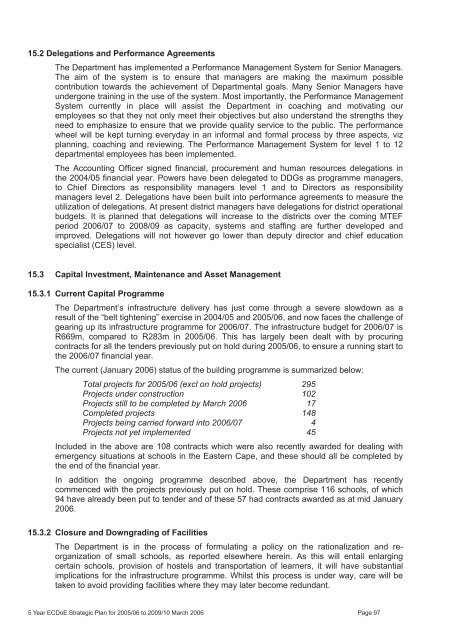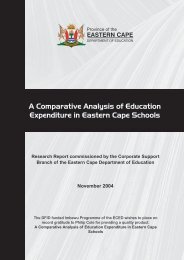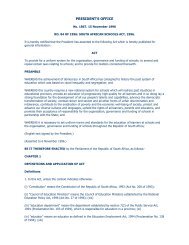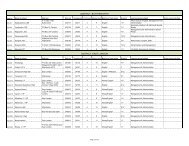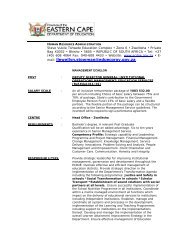part a: strategic overview - Department of Education
part a: strategic overview - Department of Education
part a: strategic overview - Department of Education
You also want an ePaper? Increase the reach of your titles
YUMPU automatically turns print PDFs into web optimized ePapers that Google loves.
15.2 Delegations and Performance Agreements<br />
The De<strong>part</strong>ment has implemented a Performance Management System for Senior Managers.<br />
The aim <strong>of</strong> the system is to ensure that managers are making the maximum possible<br />
contribution towards the achievement <strong>of</strong> De<strong>part</strong>mental goals. Many Senior Managers have<br />
undergone training in the use <strong>of</strong> the system. Most importantly, the Performance Management<br />
System currently in place will assist the De<strong>part</strong>ment in coaching and motivating our<br />
employees so that they not only meet their objectives but also understand the strengths they<br />
need to emphasize to ensure that we provide quality service to the public. The performance<br />
wheel will be kept turning everyday in an informal and formal process by three aspects, viz<br />
planning, coaching and reviewing. The Performance Management System for level 1 to 12<br />
de<strong>part</strong>mental employees has been implemented.<br />
The Accounting Officer signed financial, procurement and human resources delegations in<br />
the 2004/05 financial year. Powers have been delegated to DDGs as programme managers,<br />
to Chief Directors as responsibility managers level 1 and to Directors as responsibility<br />
managers level 2. Delegations have been built into performance agreements to measure the<br />
utilization <strong>of</strong> delegations. At present district managers have delegations for district operational<br />
budgets. It is planned that delegations will increase to the districts over the coming MTEF<br />
period 2006/07 to 2008/09 as capacity, systems and staffing are further developed and<br />
improved. Delegations will not however go lower than deputy director and chief education<br />
specialist (CES) level.<br />
15.3 Capital Investment, Maintenance and Asset Management<br />
15.3.1 Current Capital Programme<br />
The De<strong>part</strong>ment’s infrastructure delivery has just come through a severe slowdown as a<br />
result <strong>of</strong> the “belt tightening” exercise in 2004/05 and 2005/06, and now faces the challenge <strong>of</strong><br />
gearing up its infrastructure programme for 2006/07. The infrastructure budget for 2006/07 is<br />
R669m, compared to R283m in 2005/06. This has largely been dealt with by procuring<br />
contracts for all the tenders previously put on hold during 2005/06, to ensure a running start to<br />
the 2006/07 financial year.<br />
The current (January 2006) status <strong>of</strong> the building programme is summarized below:<br />
Total projects for 2005/06 (excl on hold projects) 295<br />
Projects under construction 102<br />
Projects still to be completed by March 2006 17<br />
Completed projects 148<br />
Projects being carried forward into 2006/07 4<br />
Projects not yet implemented 45<br />
Included in the above are 108 contracts which were also recently awarded for dealing with<br />
emergency situations at schools in the Eastern Cape, and these should all be completed by<br />
the end <strong>of</strong> the financial year.<br />
In addition the ongoing programme described above, the De<strong>part</strong>ment has recently<br />
commenced with the projects previously put on hold. These comprise 116 schools, <strong>of</strong> which<br />
94 have already been put to tender and <strong>of</strong> these 57 had contracts awarded as at mid January<br />
2006.<br />
15.3.2 Closure and Downgrading <strong>of</strong> Facilities<br />
The De<strong>part</strong>ment is in the process <strong>of</strong> formulating a policy on the rationalization and reorganization<br />
<strong>of</strong> small schools, as reported elsewhere herein. As this will entail enlarging<br />
certain schools, provision <strong>of</strong> hostels and transportation <strong>of</strong> learners, it will have substantial<br />
implications for the infrastructure programme. Whilst this process is under way, care will be<br />
taken to avoid providing facilities where they may later become redundant.<br />
5 Year ECDoE Strategic Plan for 2005/06 to 2009/10 March 2006 Page 97<br />
5 Year ECDoE Strategic Plan for 2005-06 to 2009-10. 21 F (5) Page 93


